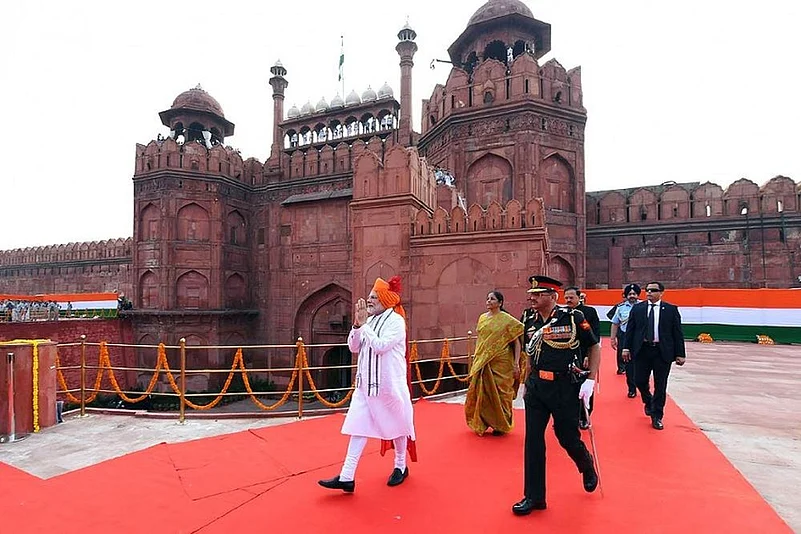Wearing a traditional turban coloured in earthen hues of saffron and red, Prime Minister Narendra Modi delivered the last Independence Day address of his term, standing against the majestic Red Fort. The 78-minute address was summing up of his government’s achievements in the last four years, as much of a pitch for 2019 Lok Sabha elections.
He took care to cover all sections of the society – the underprivileged, farmers, Dalits, women, youth, army and the somewhat disillusioned middle-class. As he stressed upon his government’s motto of ‘Sabka saath, sabka Vikas,’ he carefully included the women among the Muslims as he talked about his unsuccessful efforts to pass the ‘Triple Talaq’ Bill.
Advertisement
As he spoke about breaking the back of Delhi’s power-brokers, weeding out fake beneficiaries of government schemes to save Rs 90,000 crore for the government, taking India from red-tape to red-carpet, and the fast pace of development in the past four years, the constant underline message was to target the Congress-led UPA government, pre-2014. Modi’s message was clear -- that he is not ready to rest on his achievements but is hungry and restless for more. He was unapologetic about his ambition to lead the country beyond 2019 as he set targets for 2022 – to send an Indian space shuttle, piloted by an Indian, and to double farmers’ income.
Advertisement
“A lot of things are said about me by many people. Today, I will set the record straight publicly. Yes, I am impatient; impatient to take the country ahead as other countries are overtaking us. I am restless as children, dying of malnutrition, need to be saved. I am anxious since a huge population is denied proper healthcare,” Modi declared, making his intention clear that the poor will be the focus of his party’s campaign for the next election.
His government pushed hard to ensure the roll out of the most ambitious healthcare scheme ever – Ayushman Bharat to cover 10 crore poor families, providing health cover up to Rs 5 lakh per family per year. Modi talked about GST, and giving the Minimum Support Price (MSP) to the farmers. He mentioned the loans given to youth under the Mudra scheme. He invoked Babasaheb Ambedkar for the Constitution that speaks of justice for all. Dalits have been restive for the past few months and it was an attempt to reach out to them.
For the honest middle-class taxpayers, Modi expressed his gratitude, saying it is because of them that the government could manage to implement welfare schemes for the poor. He said that the honest taxpayers are playing a major role in progress of the country.
Prime Minister Modi spent a large part of his speech on the development of the North-East region, and how his “government has brought Delhi to the North-East.” The reference to the region binds well with its political importance for the ruling BJP. As the party is likely to lose seats in other states like Gujarat, Madhya Pradesh, Rajasthan and Chhattisgarh – where it is already at a saturation point –the BJP is looking at fresher pastures in the North-East and other states like Odisha and West Bengal to make up for the losses.
Advertisement
Modi talked about taking railways, airways, highways and information e-ways to the north-east and connecting the remote region to the rest of the country. Apart from the north-east, Modi talked about Jammu and Kashmir in a tone reminiscent of former prime minister Atal Bihari Vajpayee. He even invoked his policy of ‘Kashmiriyat, Insaniyat (humanity) and jamuriyat (democracy).’ It was a softer stance that Modi presented. The reference to surgical strike was made in passing and in the context of the army.
“Goli aur gaaliyon se nahi, hum gale laga kar Kashmir ko suljhayenge (we will solve Kashmir by love and compassion and not by bullets and abuse),” Modi said. In fact, as he mixed poetry with politics, invoked parallels with history and skillfully used statistics to show performance, the Vajpayee reminiscence went beyond Kashmir. It is perhaps also indicative of a softer approach in the run-up to the elections.




















